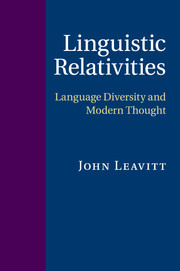Book contents
- Frontmatter
- Contents
- Preface
- Introduction
- 1 A passage to modernity
- 2 One reason, one world, many monads
- 3 The world at war with reason: Britain and France in the eighteenth century
- 4 Multiplicity and the Romantic explosion
- 5 Essences and universals through the nineteenth century
- 6 Boas and the linguistic multiverse
- 7 Linguistic relativity: Sapir, Lee, and Whorf
- 8 The other side of the mirror: a twentieth-century essentialism
- 9 The rise of cognition and the repression of languages
- 10 The return of the repressed
- Conclusion
- Notes
- References
- Index
4 - Multiplicity and the Romantic explosion
Published online by Cambridge University Press: 04 April 2011
- Frontmatter
- Contents
- Preface
- Introduction
- 1 A passage to modernity
- 2 One reason, one world, many monads
- 3 The world at war with reason: Britain and France in the eighteenth century
- 4 Multiplicity and the Romantic explosion
- 5 Essences and universals through the nineteenth century
- 6 Boas and the linguistic multiverse
- 7 Linguistic relativity: Sapir, Lee, and Whorf
- 8 The other side of the mirror: a twentieth-century essentialism
- 9 The rise of cognition and the repression of languages
- 10 The return of the repressed
- Conclusion
- Notes
- References
- Index
Summary
Das Wahre is das Ganze.
G. W. F. Hegel… das Wesen der Wirklichkeit in unendlicher Vielheit erkannt wird.
Richard WagnerThe diversity of individual personalities was presumably lived by the French and British as much as by the Germans in the seventeenth and eighteenth centuries: it's hard to imagine more distinctive characters, in opinion, style, language, and even physique and physiognomy than, say, Voltaire or Dr. Johnson. But in the debates we have been considering, the distinctiveness of each person did not carry over into a sense of that of nations or languages as a serious philosophical or political issue. The great question remained whether languages were ruled by universal reason or by a bewildering variety of immediate circumstances that derived from the local workings of equally universal natural laws.
The middle of the eighteenth century saw a new valorization of the particular and the local among many sections of the Western European intelligentsia. Besides being an effect of the increasing questioning of absolutes by French philosophers, a passion for the distinctive and the authentic was spurred on by a fad for local traditions coming largely from the British Isles with James Macpherson's (1736–1796) tremendously popular “translations” of the purported Scottish oral epics of Ossian (Bauman and Briggs 2003: Chapter 4).
In Germany, while the eighteenth century was marked by the continuing influence of rationalism and an attraction for empiricism, elements of Leibniz's system of monads stayed alive thanks in large part to the influence of the major German philosopher of the first half of the century, Christian Wolff (1679–1754).
- Type
- Chapter
- Information
- Linguistic RelativitiesLanguage Diversity and Modern Thought, pp. 72 - 95Publisher: Cambridge University PressPrint publication year: 2010



